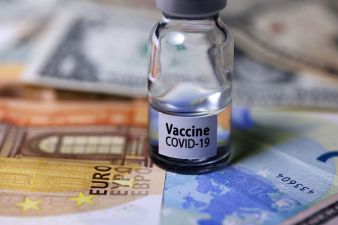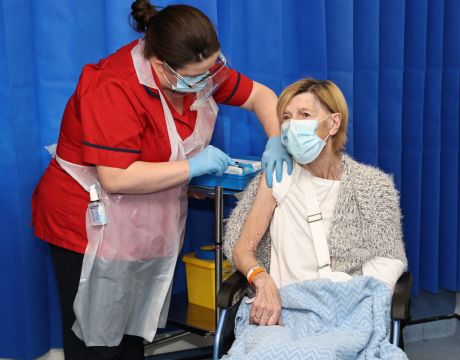Over 99 per cent of people offered the Covid vaccine in the first allocation groups have chosen to receive the first dose according the HSE.
Up to January 27th, 99.6 per cent of people offered the vaccine chose to accept it, with 147,700 first doses being administered in the State up to that date.
Healthcare workers and people over the age of 65 who are resident in long-term care facilities were the first to be offered the vaccine.
In a statement to Breakingnews.ie, the HSE confirmed approximately 0.4 per cent of those who have been offered the vaccine to date have made the decision not to take it.
The HSE added: “Participation in vaccination programmes in Ireland is not mandatory. Should a person change their mind, vaccination can be made available to them.”
The current allocation of vaccines has been determined by the Provisional Vaccine Allocation Groups list which was published by the Government in early December.
The HSE said the list is “critical given the limited supply of vaccine”, aiming to inoculate those most likely to suffer sever illness due to Covid-19 and those in direct contact with the virus before commencing more widespread vaccination.
Vaccine rollout
After the Pfizer/BioNTech vaccine became the first to gain approval from the European Medicines Agency (EMA) on December 21st, the first dose was administered in Ireland on December 29th.
Since the start of 2021, the HSE has published weekly updates on the vaccine's rollout in the State, showing that over 35,000 people received their first dose of the Pfizer shot between January 4th and 10th.
According to the HSE's figures, between January 11th and 17th, 48,400 vaccines were given, 23,100 of which were to frontline healthcare workers and 25,300 to staff and residents in long-term care facilities.
That same week, following the approval of the Moderna vaccine by the EMA on January 6th, half of the first 3,600 dose delivery was administered to GPs and GP practice teams, with the second half of the shipment being saved for their second doses.
Last week, 6,000 hospital workers received their first or second doses, while 41,000 staff and residents of long-term care facilities were given their first shot.
The HSE estimated approximately 45,000 frontline healthcare workers received their second jabs this week, along with 6,551 staff and residents of long-term care facilities who were due to receive their first or second doses.
Vaccine hesitancy
Although the uptake has been high among the first two cohorts to be offered the vaccine in Ireland, there are worries this may not be the case across the board.
An overview of vaccine hesitancy by senior parliamentary researcher Dr Jessica Doyle in November said evidence suggests "trust in vaccines has decreased and vaccine hesitancy has increased across many developed nations over the last decade".
Dr Doyle's overview cites opinion polls which show a much larger percentage of the population may be slow to accept the jab than has been noted among healthcare workers and people in long-term care facilities.
According to an RTÉ opinion poll, 56 per cent said they were 'likely' to take the first EU approved Covid-19 vaccine, while 32 per cent said they were 'unlikely' to do so. Meanwhile, a poll conducted by Amárach Research for Virign Media Ireland found 67 per cent were willing to receive the vaccine.
These figures largely correspond with vaccine hesitancy rates in other countries, with Dr Doyle referencing France, Italy and the US, where between 25-50 per cent of people indicated they would refuse to accept the vaccine.
Vaccine scepticism
In the UK, there is also research to suggest this hesitancy is stronger among some ethnic groups, with data from the UK's Office for National Statistics finding only 49 per cent of 150 black/black-British adults included in the data saying they would get the shot, compared to 85 per cent of the 13,240 white adults surveyed.

Research reported by the BBC, which was collected by councils across London also found younger people are more likely to be sceptical of the vaccine, with 7.14 per cent of people aged 16-24 saying they would definitely not take it when offered and 21.43 per cent said they were unsure.
In comparison, the same study found no one in the over 75 age-group said they definitely would not receive the jab, and just 8.62 per cent said they were unsure.
In Ireland, the HSE and public health experts are working to tackle vaccine disinformation and hesitancy, with a public information campaign due to begin in the coming days.
The campaign will come ahead of the arrival of the first doses of the AstraZeneca which received approval from the EMA on Friday for people over the age of 18.







